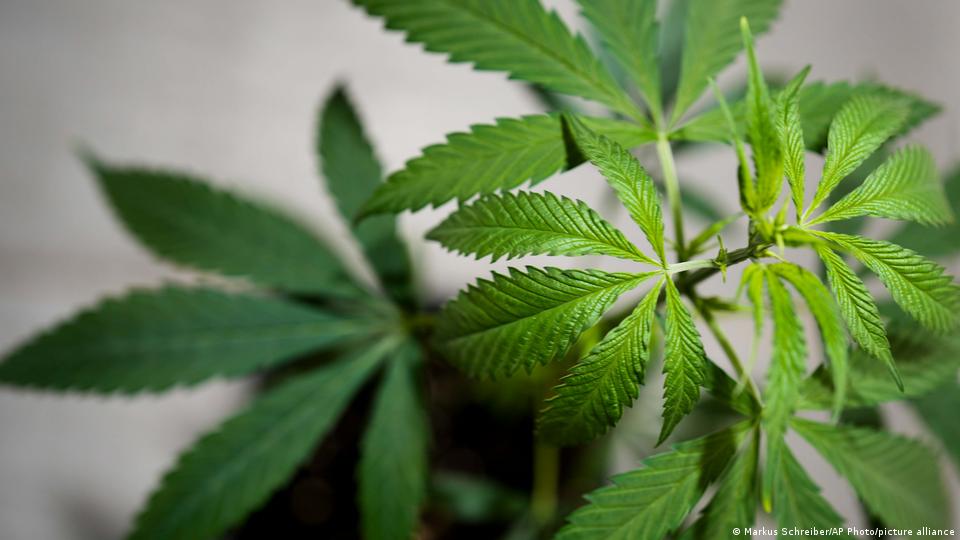
Germany’s ruling coalition has introduced new legislation that will permit restricted possession and cultivation of the drug.
The Christian Democratic Union, known for its conservative stance, stood against the government’s proposal.
The Bundestag has approved the legalisation of cannabis consumption.
German lawmakers have given the green light to partially legalise cannabis in the country.
407 parliamentarians supported the legislation proposed by the ruling coalition, which includes Chancellor Olaf Scholz’s center-left Social Democratic Party (SPD), the business-focused Free Democratic Party, and the environmentalist Greens.
226 legislators voted against the bill. Four Members of Parliament chose not to vote.
The ruling parties claim that the latest legislation will enable the responsible consumption of cannabis by allowing limited legal access to the substance under strict regulations and guidelines.
There is a significant split among Germans regarding the measure, as indicated by a recent YouGov poll. Approximately 47% of respondents support it to some extent, while 42% oppose it to some degree.
What is the comparison between Germany and other EU countries?
If the cannabis bill is passed in Germany, it would become part of the increasing number of European countries that have either legalised the drug or decriminalised its usage.
The Netherlands is widely recognised for its cannabis-tolerant policies, with the proliferation of coffee shops dating back to the 1970s.
Having up to 5 grammes of cannabis is no longer a criminal offence, but growing, selling, and having drugs is still against the law.
Malta currently has some of the most lenient regulations in the EU, permitting adults to possess up to 7 grammes of cannabis and cultivate up to four plants at home. Using marijuana in public places is still not allowed.
Luxembourg has legalised the possession of cannabis in public and the cultivation of up to four plants.
Portugal has recently changed its approach to the use and possession of cannabis, now treating it as an administrative offence.
In Spain, individuals are permitted to consume up to 100 grammes of the substance for personal use. Consuming or possessing cannabis in public places remains prohibited by law.
Multiple EU countries have legalised the use of marijuana and its derivatives for medicinal purposes.
Germany’s population is split on the partial legalisation of cannabis
Almost half of the residents in Germany are in favour of the proposed partial lifting of the ban on cannabis, according to a survey conducted by YouGov on Friday.
According to the survey, 47% of participants support the proposed law to some extent, while 42% oppose it to some degree.
Out of the 2,151 individuals surveyed last week, approximately 11% did not express a strong opinion.
The vote in Germany’s lower house of parliament, the Bundestag, is just a few hours away

For years, discussions about cannabis legalisation have been filled with misinformation and unverifiable claims.
Is cannabis considered a gateway drug? Which is more harmful: alcohol or cannabis? Is it possible to overdose on cannabis? Is it true that cannabis can harm brain cells?
With Germany’s lower house of parliament getting ready to vote on potentially relaxing restrictions on the drug, DW’s fact-checking team delved into the research and consulted with experts to debunk common misconceptions. Check out our article here.
Health minister believes the argument against the legalisation bill is not convincing enough.
German Health Minister Karl Lauterbach, a member of the center-left SPD, criticised the notion that cannabis should not be legalised due to challenges in monitoring and policing.
“We will implement a certain control effort, but within reasonable limits, and I believe that this situation will quickly settle down,” he mentioned in an interview with Phoenix TV on Friday.
“The same argument was used at the time was used to argue against the seatbelt requirement,” Lauterbach added.
Some people expressed concerns that enforcing the requirement for drivers to wear seatbelts or face a fine would be challenging.
“Whenever a significant new law is introduced, we go through a monitoring phase, especially in the initial stages,” stated the health minister.
The conservative CDU has stated that regulations limiting the use or cultivation of cannabis would place a heavy burden on police and the justice system.
A group of doctors is cautioning against the legalisation of cannabis
The leader of the German medical association (BAK) cautioned against the potential legalisation of cannabis before the anticipated Bundestag approval on Friday.
“Cannabis has the potential for dependence; approximately 10% of regular users of cannabis develop an addiction,” stated Klaus Reinhardt in an interview with public broadcaster WDR.
Additionally, consistent intake until the age of 25 may disrupt the brain maturation process, he noted.
This drug poses a significant risk and should not be legalised.
Reinhardt is concerned that legalisation could lead to an increase in the number of people trying the drug.
He expressed concern that if the ban is lifted, some individuals may be tempted to try it out, thinking it’s not as bad as previously believed.
What is prompting Germany to consider the legalisation of marijuana?
Germany’s governing coalition is of the opinion that the current drug ban policy has been ineffective, with an increasing number of residents, including many young people, using cannabis. The ruling coalition is made up of the center-left Social Democratic Party (SPD), business-focused Free Democratic Party (FDP), and the environmentalist Greens.
The coalition announced that the latest legislation aims to promote the responsible use of cannabis by allowing limited legal access to the drug under strict rules and regulations.
As of April 1, adults can now cultivate up to three cannabis plants at home and have 50 grammes there.
Adults can possess up to 25 grammes for personal use in public.
Starting July 1, cannabis clubs can now engage in joint cultivation with up to 500 members.
Clubs have the option to distribute up to 25 grammes per day or 50 grammes per month to their members, with a reduced monthly allowance for individuals aged 18-21.
The law is intended to combat the black market, decrease drug-related crime, and prevent the distribution of harmful substances, according to Health Minister Karl Lauterbach.
According to the Green Party health expert Janosch Dahmen, this marks a long-awaited change in drug policy.
Dahmen emphasised to DPA news agency that education, prevention, and legal protection for children and teenagers are “the guiding principles of the law.”
Rules have been put in place to prohibit the use of cannabis in schools, sports facilities, and areas nearby.
Approximately 18 months following the implementation of the law, an evaluation will be conducted to determine its impact on children and young individuals.
On the other hand, the health expert for the Christian Democratic Union (CDU) Tino Sorge, in opposition, referred to the law as a “historic mistake.”
“The government is making cannabis more accessible to children and young people and behaving like a state-controlled drug dealer,” he remarked.
There has been significant criticism of the plans from medical associations and the judiciary, citing concerns over health and criminality.
mm/wd (dpa, KNA)
While you’re here: Every Tuesday, DW editors provide updates on the latest events in German politics and society. Sign up here to receive the weekly newsletter Berlin Briefing.





More Stories
THE CITY WITHOUT LAWS IS SLAB CITY
An image of a Wild Orangutan Using a Herb to Cure his Wound
Meet the richest Family in the World, who Possess 700 Cars and Live in a $478 Million Home